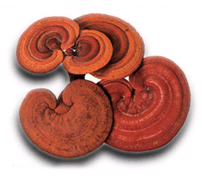
Reishi
Introduction
This fact sheet provides basic information about Reishi. The reishi mushroom is a purplish-brown fungus with a long stalk, brown spores, and a fan-shaped cap with a shiny, varnish-coated appearance. Reishi grows on decaying wood or tree stumps, preferring the Japanese plum tree but also found on oak. The mushroom is native to China, Japan, and North America but is cultivated throughout other Asian countries. Cultivation of reishi is a long, complicated process.Reishi has been used in traditional Chinese medicine for more than 4,000 years for treating fatigue, asthma, cough, and liver ailments, and to promote longevity. The Chinese name lingzhi means "herb of spiritual potency." A Japanese name for the reishi is mannentake , meaning "10,000-year-old mushroom." Reishi's use is documented in the oldest Chinese medical text, which is more than 2,000 years old. Cultivation of reishi began in the 1980s. A survey conducted in Hong Kong found G. lucidum to be the third most common herbal preparation taken by preoperative surgical patients.
Common Names
Reishi, Ling Chih, Lingzhi ( Ling Zhi ), "Spirit Plant," GanopolyLatin Names
Ganoderma lucidumWhat It Is Used For
- The polysaccharide content of reishi mushroom is responsible for possible anticancer and immunostimulatory effects. Reishi may also provide hepatoprotective action, antiviral activity, and beneficial effect on the cardiovascular system, rheumatoid arthritis, chronic fatigue syndrome, and diabetes. Few clinical trials have been conducted.
How It Is Used
The Pharmacopoeia of the People's Republic of China recommends 6 to 12 g reishi extract daily. Ganopoly (a Ganoderma lucidum polysaccharide extract) in doses up to 5.4 g daily (equivalent to 81 g of the fruiting body) for 12 weeks has been used in a few clinical trials.What the Science Says
- Clinical trials have been conducted in patients with advanced cancer. Not all published trials are randomized and blinded. Ganopoly in doses up to 5.4 g daily (equivalent to 81 g of the fruiting body) for 12 weeks were used. Increased cellular immunity indices were reported in 80% of cancer patients in one trial. Quality of life improved in 65% of patients in another trial. In a further trial, varying results were obtained. It was proposed that ganopoly could reverse the immunosuppressive effects of chemotherapy and radiotherapy.
Side Effects and Cautions
- None well documented.
Sources
- Drugs.Com Web site. Accessed on February 7, 2009.
- From Wikipedia, the free encyclopedia. Accessed on February 7, 2009.






